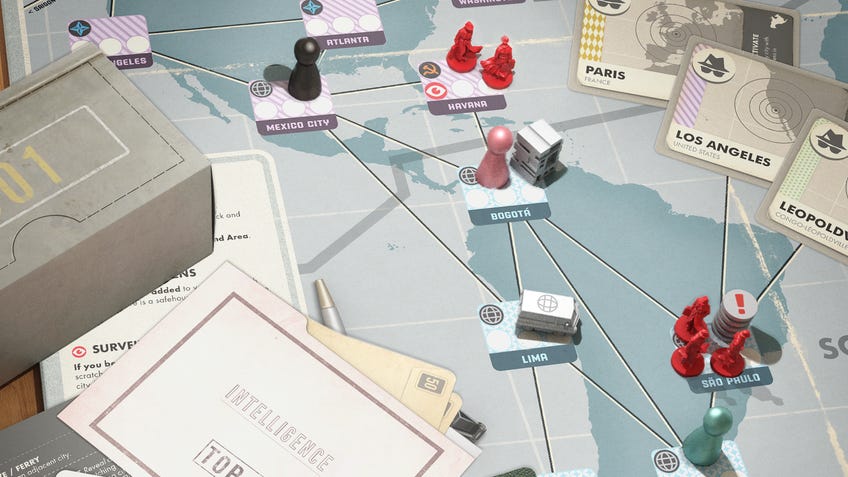“I feel like we told a good story”: Pandemic Legacy creators Matt Leacock and Rob Daviau on ending the series at its beginning
The designers discuss closure in Season 0, the trilogy’s influence and whether there’s a chance they’ll ever return.
It’s been three years since the last Pandemic Legacy game, and five years since Season 1 first reinvented the co-op hit with its widely acclaimed campaign. Countless cards have been torn, endless stickers have been stuck and the excitement of opening the next box of surprises hasn’t dimmed. But with Pandemic Legacy: Season 0, the series comes to an end.
Co-designers Matt Leacock and Rob Daviau are seemingly going out on a high, as they take the trilogy - and the wider Pandemic series - in a brand new direction with a Cold War spy thriller set before the world’s disease-driven descent. With a completely new setting comes completely new gameplay ideas and story reveals - and, of course, no shortage of twists and turns along the way.
Ahead of Season 0’s announcement, we spoke to Leacock and Daviau about exploring the origins of the universe in the prequel game, using the fragmented world of the Cold War as a backdrop and the legacy of the trilogy as they bring it to a close.
Note: Nothing discussed below goes beyond the rules and general story elements set up during Pandemic Legacy: Season 0’s opening prologue game, so it should be completely spoiler-free.
Around the time of Season 2’s release in 2017, you said you envisioned the Pandemic Legacy series as a trilogy. Did you come into Season 0 with a sense of this is it - this is going to be the big finale?
Rob Daviau: Very much so.
Matt Leacock: These games are very big projects. So knowing that this third one would be the last - I think it helped, at least for me, steel myself into getting into the project knowing that this was going to be the last hurrah.
Daviau: When we did Season 1, we didn't know it was going to be a trilogy. But as soon as we turned it over to the publisher the idea of sequels came up right away. So when we started Season 2, maybe about halfway or a third of the way through the design of that, we said, “Well, how many of these are we doing?” We settled on a trilogy and, in a very rough way, we specced out what would be the third game. Basically the setting and a top level so that we knew where we were going in Season 2. When we started the last one, we had a very rough blueprint - which to some extent held true.
Does that include the fact that it was going to be a prequel? You knew that it was going to be 1, 2, 0?
Daviau: Yeah. We basically said this is going to take place as a Cold War spy thriller. And it's going to be the origin of it: how we got here, rather than following on in a post-post-post-apocalypse.
How did that background shape the gameplay mechanisms you were working with?
Leacock: The mechanisms in Season 0 were driven more by the theme and by the need to be different from the other two games. We needed to carve out something that felt, you know, worthy of standing alongside the other two, and that felt like it made sense and was integrated into the theme.
Without giving anything anyway, are you able to outline those things that do feel different to the past two seasons? And, of course, the original Pandemic, which at this point I imagine we're moving quite far away from...
Daviau: Well, we are and we aren't. We sort of go back and start from the core Pandemic game and figure out if we can go in a slightly different direction rather than building off the previous game. As we've done these, we've gotten a bit of a toolbox and lessons learned and things that we've done that we can use again, and things that we've done that we don't want to repeat ourselves because we did it last time.
It's very much a spy thriller with a medical threat in the background.
I think going into it, we did have the idea of the passports and the different identities. I remember talking about it with Matt, a few months before we started. We were at a convention together and we hadn't started yet, but we were talking about that. Actually, we were in Berlin - we were in what had been East Berlin, going to a former Soviet restaurant with a guide. And we're like talking about, “Hey, well, this is research!”
The idea of having teams is sort of a different thing from other Pandemics. I believe. Matt, correct me if I'm wrong - you obviously have much broader knowledge of all the Pandemics.
Leacock: Even I have to stop and pause and think for a second! Yeah, there's sort of- I don't want to say they're NPCs, but they're like these powerful things that you can drive as a player. Literally drive around the board. They're sort of like covert teams in little white vans that you can command. I don't think we've really seen that in another Pandemic game.
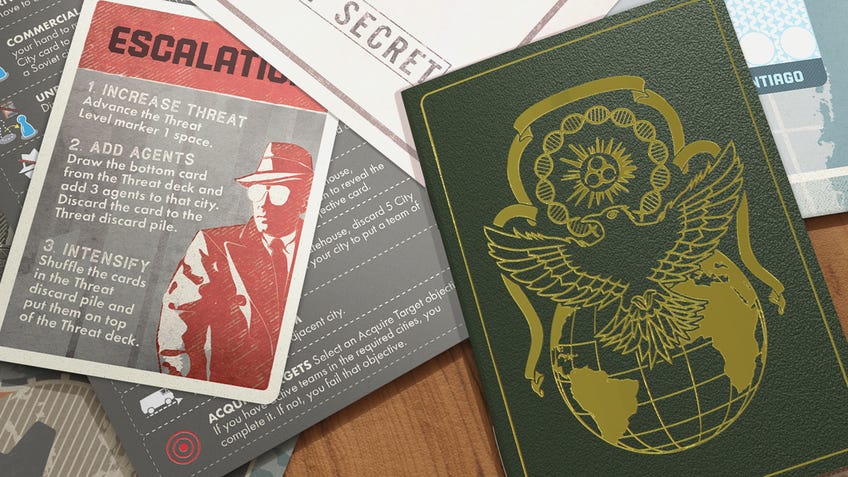
Were the teams something that arose out of the Cold War setting and spy thriller theme, or were they a separate gameplay element that you had in mind regardless?
Leacock: [It] kind of combines the two, really. We needed a strategic objective for the players [and] assembling these cover teams makes them more powerful, so you want to work toward that. And then that meshes really neatly into the spy theme as well; you can send them to complete missions in a sense. So it's all both. We needed a way to drive the players forward and also to tell the story.
This is very much a prequel in the sense of the diseases are rumour.
Daviau: At the start of the campaign, you are doctors or people who graduated medical school who were recruited by the CIA to become covert agents - spies, in a sense. Because there's rumour that the Soviets are working on a bioweapon. It's very much a spy thriller with a medical threat in the background. You can't use the cards to cure a disease if you don't know what it is or where it is or how it's going to be deployed. The regular Pandemic game sort of starts mid-pandemic; there's known strains of a disease and you're deploying to keep them contained. This is very much a prequel in the sense of the diseases are rumour.
Leacock: The story just unfolds as you learn more and more about it. It also lets you step into the shoes of a spy trainee. You don't know much about your craft yet. You're a medical student and the CIA figures it's easier to train a doctor to be a spy than a spy to be a doctor.
You say there's an element of trying to seek out this bioweapon because you don't know where it is. Does that mean there are returning gameplay elements from Season 2? Revealing the map as you explored was a big part of that game.
Daviau: No, the map is all known from the beginning of this game. But what's different is the world is not free to travel around in. The different cities are marked as either sort of a NATO-US Western alliance or a Soviet Bloc alliance or unaffiliated with either. And depending on which city you're going into, it gets harder to travel around. If you have a US passport and you need to go to Leningrad it's a little harder to get in. You have to sort of get behind the lines and then do it. So there's three flavours to the cities in this game and different teams and different actions are slightly modified in each one.
At the beginning of the game there are no disease cubes on the board; the growing threat that is Soviet agents who are looking for you.
We were careful not to overwhelm the decision matrix here. But if I build a team with five Western alliance cards, that is a team whose cover alias is that they're from the West so you can't go deploy them in Soviet cities because their cover will be blown. So you have to deploy them to areas of Western Europe, but they're not going to work in East Berlin - you need to create a team with a Soviet background. That's what the five cards represent: establishing their aliases and their backstories and getting the people together, so that when they're driving around in this van they’re like “Oh no, we're just electricians from Warsaw.” That's where it starts. At the beginning of the game there are no disease cubes on the board; the growing threat that is Soviet agents who are looking for you and other things. And you're trying to elude them because they know that the West is onto their plan, so they're trying to find you.
Did you draw inspiration from particular classics of the spy thriller genre for the theme? Are there references to certain real-life events, or is it largely fictionalised?
Daviau: It's largely fictionalised. We did do our homework. I remember watching Three Days of the Condor.
Leacock: I read the history of the CIA, Legacy of Ashes, and the history of the KGB and all that crazy, crazy research material. But we also did a lot of deep dive into the fiction as well.
Daviau: We were studying which cities were allied with different [sides]. Because places like Cairo, as they had government upheaval and changes, would change their affiliation during the early 60s. So we had to lock down a year and then a map where the numbers worked.
It's been five years since the first Pandemic Legacy. In that time you've both been working on these three games together and seeing them evolve. Have you found that your working relationship has also shifted as you approach each of the games?
Daviau: Certainly from the first one. You know, on the first one, like, “Matt, are you married?” “Oh, do you have kids?” We didn't really know each other. And now, after three projects, we have an understanding of who the other person is, and there's various times where one of us will get stuck and the other one will have to sort of pull it forward. And I think we're very respectful. I don't think we get into arguments. Do we?
Leacock: No, I don't think we do. I mean, occasionally someone will stand their ground. But it's remarkable when [they do] in that there's very little contention. It's sort of like, “Well, you know.” The other side will quickly concede it, and generally they're wrong. [laughs]
Looking from the outside in, it seems that Matt is more of a mechanism-focused designer while Rob comes more from the storytelling side. Since you've started collaborating, have you found yourselves exploring the other side more - with the added knowledge or insight into how the other does something?
Leacock: Oh, yeah, yeah. I have just all sorts of appreciation now for storytelling and structure and all the different things you can learn from scene construction and beat analysis. I'm all in on the story side now. I think it's really amazing what it can bring to a game. Not that every game needs to be centred around that. But, wow, that's a really powerful toolkit. And it's been fun to explore all that with Rob.
It's really amazing what story can bring to a game.
Daviau: Likewise. Although, before I get into it, it's interesting; I think people make the assumption - and I can understand why - that I come in and write all the words and tell all the story and Matt does all the mechanisms, and it's like music and we put it together and see if it works. But 80% of the game is us working on every piece together. I tend to do a lot of the final writing and Matt does a lot of the final math in production and working out some systems. So the final development we tend to go to our corners a little bit. But story is done together, mechanisms are done together.
That said, I have learned a tremendous amount from working with Matt of the discipline to do a game that's light. I tended to be more bombast earlier on; you know, more is better and people will figure it out. And I'd say, “Ah, this rule is good enough!” Now we will spend half an hour crafting three sentences to fit exactly on a card to leave enough room for the German translation. That sort of discipline to just keep carving and carving and reduce it, and that economy of design and the discipline to do so is something that I have tried to integrate into my work, outside of working with Matt.
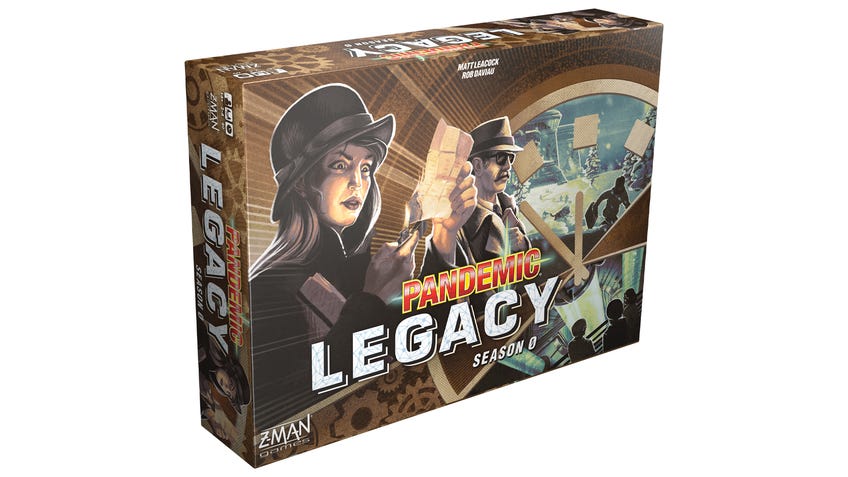
Were there any gameplay ideas that you explored for Season 0 that didn't pan out? That you either felt weren’t very treading new enough ground, were too ambitious or just didn't gel in the right ways?
Daviau: I'm sure there's dozens of them, but you forget them once they didn't work. I remember having this day where we had to solve a problem, I don’t remember what. We came up with a solution and then spent, like, an hour and a half with Matt sharing screens of the iconography and the exact rules, and how we're going to put that on the card. We really did all that nuts and bolts, nice and cool. And then I took out a deck of cards and started playtesting it and we, to our horror, realised this idea didn't work at all and we had jumped to execution before testing it. We went, “Well, someday we'll figure out how to not do that,” and threw three hours of work away, like, “Okay, so how are we going to solve it now?”
Leacock: At least it was three hours instead of three weeks. I think we went down fewer- or maybe not fewer blind alleys, but when we went down a blind alley, it wasn't for as long. We learned how to kill things early in this one compared to Season 1.
We had to push ourselves to find new and interesting mechanisms and storytelling structure so that this felt different than the other two games.
Daviau: What we did discover with this one is, with two games done, we had a world now and we had a story and, as a prequel, we're filling in backstories and trying to drive to a story that's already established. We also had done a bunch of things like the map that gets revealed and player characters having relationships in Season 1. So when we think of an idea, sometimes we get excited and say “Oh, well we kind of did that in Season 2 quite a bit. It feels like more of the same.”
We had to push ourselves to find new and interesting mechanisms and storytelling structure so that this felt different than the other two games. That you weren't sitting down and just having the exact same thing a third time. Knowing this was the last one made that easier. If this was three out of eight I don't know where we'd be right now.
Legacy games have typically been reliant on non-typical components beyond pawns, cubes and cards, whether it’s stickers, scratch-off panels or more elaborate items. Were you able to be more ambitious in terms of production in Season 0?
Daviau: What's interesting is you can do a lot of interesting things with standard components. So there's a few. The passports are different; the leatherette cover and photos that can go inside. And so there was some sort of detail of trying to make that prop feel authentic.
We wanted to make the game feel like a morally grey area. You're gonna be making a lot of choices that aren't cut-and-dried.
There's a whole other debrief book that's new in there, which is sort of like one of those chapter books when you go to inquiry 125. So this game, more than others, different groups will play through and get a very different understanding of what the story is. That's where we really tried to do something different, given it's a Cold War thriller and almost all of those spy movies have some point where you're like, “What's going on for real here?” We wanted to make the game feel like a morally grey area. You're gonna be making a lot of choices out in the field as a spy that aren't cut-and-dried. It's not being a doctor. It's not you know, do no harm and save their lives. It's what's the greater good here?
Once you get to the end of Season 0 is there post-campaign content or the ability to keep playing? Or does it come to a full stop?
Leacock: With all three of these [Pandemic Legacy games], you get one great story and all your actions have really big consequences. We've never really promised any kind of replay at the end.
Daviau: What we have done with this one is found a way - again, with that sort of morally grey area - to get you to play slightly fewer games. You're gonna play closer to 12 games than 16 to 18. In the past, if you lost a game at the beginning of the month, you went back and redid it and then, win or lose, you moved on. We created a third state: adequate. You're getting reviewed by your CIA handlers back at headquarters. There are objectives on the board. If you complete all of them, you get like 'Hey, good job, you're doing great in the field.” But if you fail one, but succeed on the rest you get, “You know what? Good enough. We don't have time to do this again.” It's better to do all of them. But a lot of times you're going to realise when you're out in the field, like, which one is the one that we fail? But you only get to read the debrief entry if you succeed or you'll get a different debrief entry. So what piece of information might you not get if you choose to let it fail? Those are the decisions that we're trying to get people to be in as these doctor rookie spies who are in over their head and let loose under not ideal conditions.
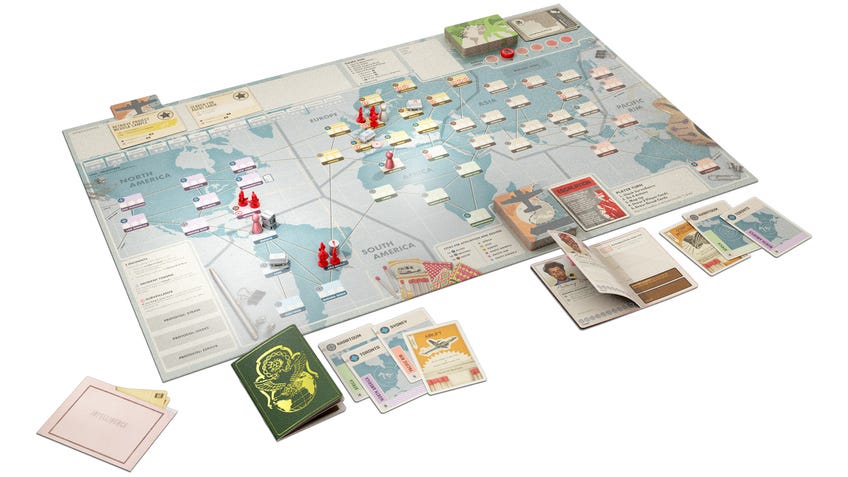
After Pandemic Legacy: Season 1 it felt like there was a burst of “legacy” games. And now there seems to be a new trend of legacy-adjacent games - games such as Oath where there are repercussions into future playthroughs, but no destructible components or permanent changes. On the other hand, you have experiences such as the Exit: The Game series, which are similar to legacy games because you're tearing things up, but they’re designed for a single play rather than a campaign. How do you feel about where legacy gaming has come in the last five years as you've designed these three games and looked at - or at least been surrounded by - other legacy games?
Daviau: We actually started Season 0 13 months after Season 1 came out, in November of 2016. So we did all three of these games in about two and a half years. This one took a little longer because we knew we had time. So where the other ones were about 13 months each and they overlapped - we did half of Season 2 before Season 1 came out, and we started Season 0 a year before Season 2 came out - this one took a little longer, so it didn't finish until last year. But we were not as influenced by some games in the past couple years as you'd think because, by the time they came out, we were 70% done [with] the core systems and were looking at refining them. We're trying to strike while the iron's hot and also just keep some momentum on these. If I started right now, Season 0 after 1 and 2, I'd have to go back and replay them where everything was fresh and in our minds.
It's just really starting to hit me the influence and reach that these early legacy games had.
As you move on from Pandemic Legacy, how do you feel about the influence it appears to have had across the industry?
Leacock: I’ve just been happy with the way they've been received and that they've sort of served as, along with Risk Legacy, a template for so many other ones to follow. I've been enjoying playing the other legacy games because I can kind of step outside. Rob and I don't get to play these really - we get to playtest them, but we don't get to play them. So, selfishly, it's been kind of fun to enjoy others that have come up after and see what kind of things that other designers are doing. It's a really rich toolbox to play with. For me, it's just fascinating to see what other designers do with it.
Daviau: It's just really starting to hit me the influence and reach that these early legacy games had. I actually had purchased a couple, and started them with various other groups in February. And then we all got quarantined.
Looking back on the complete trilogy, are there seeds you planted at the start of Season 1 that you look back on now and would have done differently, feel didn't get fully explored in the way that you expected or that you would have even left out knowing where you would eventually take the series?
Daviau: I'm sure. I mean, I don't think there's a game that I've done that I don't pull out X years later and go, “Why did I do that?”
Leacock: They're fairly minor things for me. Nothing really structural, I don't think. Like Rob said, you always look back and go “Maybe that could've been tweaked a little bit different.”
I have made the joke that when we do the 15th anniversary edition of all three, we can go back and clean up our mistakes, like a director's re-release.
Daviau: I've learned to accept that someone will ask you a question or point something out or you look at and go, “No, I just missed it. I tried as hard as I could. And it was the best at the time. And now that you point this out or time has passed, yep, that could have been better.” It's just part of making something. There have been fewer of those in Pandemic Legacy than some other games. I think that goes down to two people giving it their all and being very disciplined about it, but I'm sure there's stuff in there.
I have made the joke - and I'd like to say it's a joke. I said, “Well, when we do the 15th anniversary edition of all three of them again, we can go back and clean up our mistakes.” Like a director's re-release or something. But there's no real plans for that. And I don't know what we would actually do with it if it happened.
Leacock: I find the whole prospect horrifying. [laughs]
Daviau: Every time I make that joke, Matt's like, “No.” I'm not saying we do it. But when we get stuck on something, I'm like, “Well, let's just try this and we'll clean it up in the director's cut.” He's like, “Stop saying that!”
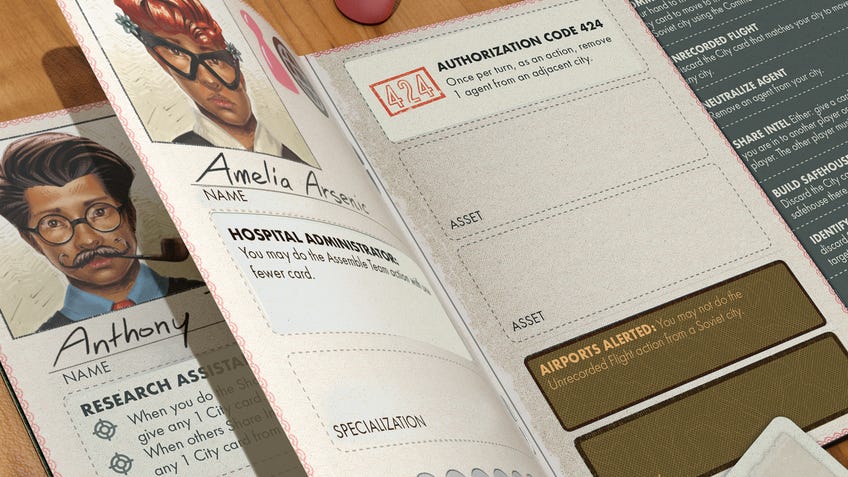
Do you have plans for future projects together as a whole? Do you feel like you need to take a break from either legacy games or certain aspects of the Pandemic series before you come back to them?
Daviau: We'll work together again.
Leacock: Yeah, that's a good way to put it.
Daviau: Individually, I've been spending more time as the chief creative at Restoration Games this year, working on Return to Dark Tower and some other things. One of the things I enjoy about working for myself is I get to reinvent my job description every couple of years to try something new. Either by design or just by fate, the world will change out from underneath me. So for the next year or two or three, that's going to be my primary focus. But I do carve time out for non-Restoration games and working with Matt is high on that list.
Leacock: I look forward to continuing to work with Rob. We don't have a project going. It's going to be disorienting for me since we've been working on these projects for so long.
Daviau: I do have to say, I'm very excited to see this come to a conclusion. You know, it's been a few years since the last one came out. I feel like we told a good story. For those people who haven't played Season 1 and Season 2 in a while, before you sit down, it might be good to talk as a group for a few minutes and be like, “What happened in those games?” Because we really did try to tie it all together in a narrative. We also would say you can just play it on your own and it should make sense.
I'm sure there's some ideas way back at the start that would make a cool different game. But ideas are very easy. Games are hard.
You've spoken of closure with this game, but are there any loose threads you've left for yourselves? Even if they're not in the game, just a notebook somewhere, so - in, say, five or ten years - you can both come back to it rather than feeling like you've sealed it off completely.
Leacock: Oh, there's plenty of scenes where we can stitch things in. I think that that wouldn't be a problem at all. If we ever get the inch and, like you said, five years. [laughs]
Daviau: Matt's very good at keeping a design journal where we just write down everything we're talking about and it's in a Google Doc. And I think by the end it was well over 100 pages of notes and thoughts, records and notes from meetings. [Leacock checks: it’s 133 pages.] Not even like the game itself. It's just what we were talking about, what we were thinking about. It's invaluable.
Some of it you go, “Hey, yeah, a lot of this stuff we actually did and some stuff just we didn't get to, it was like too many things.” We had a lot of ideas and we picked the ones that worked. I'm sure there's some ideas way back at the start that would make a cool different game. But ideas are very easy. Games are hard.
This interview has been edited for clarity and length.
